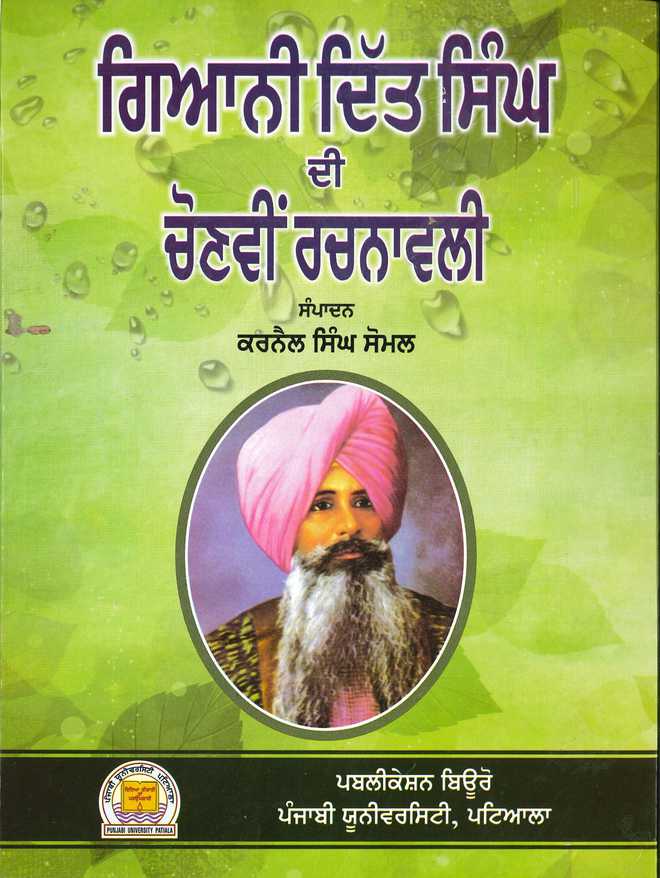A social reformer and a scholar
Jaspal Singh
Giani Ditt Singh, a doyen of Punjabi letters in the second half of the 19th century, was born at Kalaurh, a village near Fatehgarh Sahib, in a weaver’s family around 1850. He died at Lahore on September 6, 1901. At the age of nine he was sent to Tiwar village near Kharar to study at a Gulabdasia dera where he learnt Punjabi, Hindi, Urdu and Sanskrit. Later on he learnt English as well. The followers of Gulabdasia sect believe in epicurean way of life and they do not believe in any ritualism.
As he grew up, Giani Ditt Singh (Ram Ditta was his original name) became a social reformer of sorts exhorting people to give up all kinds of superstitions. He moved from one centre of learning to another in search of knowledge and ultimately reached Lahore were he passed the Giani examination and acquired other qualifications before being appointed a professor of Punjabi at Oriental College, Lahore. Giani Ditt Singh came in contact with many scholars of the day at Lahore and acquired a good debating skill in their company.
He remained under the influence of Arya Samaj for some time. But after learning about Swami Dayanand Saraswati’s disparaging comments about Guru Nanak, he engaged the great Swami in debates on spiritualism and other philosophical matters. Three such debates took place in Lahore after Swami’s arrival there in 1877. By 1888 when the 11th anniversary of Lahore Arya Samaj was being celebrated, Gianiji snapped all ties with the Samaj. Henceforth, he became a staunch supporter of the Singh Sabha Movement and played a very important role in the organisation of its Lahore unit. Being an excellent speaker, he became a roving savant delivering lectures on Sikh doctrine at various gurdwaras, schools and other centres of learning. At some places he was even subjected to humiliation because of his Dalit background. Giani Ditt Singh is the first modern prose writer and journalist of Punjabi. He remained the editor of the Khalsa Akhbar Lahore for many years in the last quarter of the 19th century.
The publication bureau of Punjabi University, Patiala, has published a mammoth volume of his selected writings titled Giani Ditt Singh Di Chonvi Rachnavali edited by Karnail Singh Somal as a tribute to the great 19th century Sikh scholar who hailed from Somal’s own village. This imposing collection has been divided into four sections. The first carries those writings which Gianiji penned before joining the Singh Sabha Movement. These are Qissa of Sirin Farhad, Abla Nind Parbhodh and Man Sambodan Granth. The second section has three parts, the first comprises biography of six Sikh gurus — Guru Nanak, Guru Angad, Guru Arjan Dev, Guru Hari Rai, Guru Teg Bahadur and the Jiwan Charat of Guru Gobind Singh (part one). The second part of this section carries the detail of martyrdom of brave Sikh women for their faith. The third part comprises interpretations and exegeses of the holy verses of Guru Nanak and Guru Arjun Dev. The third section consists of writings pertaining to social reforms, ethical matters and the debates with the people of other faiths, including those with Swami Dayanand Saraswati. The fourth section includes Giani Ditt Singh’s selected essays and articles from the Khalsa Akhbar Lahore.
Whatever he wrote was targeted towards the common man, though he engaged the well-known contemporary scholars and preachers in dialogical debates to emphasise the logical pre-eminence of the Sikh doctrine and praxis as enunciated by the great gurus. He was able to express his ideas in a simple language with appropriate figures of speech and illustrations.
No doubt the leaders of the Singh Sabha Movement remained on the right side of the state power, yet their craving for freedom was strikingly conspicuous in their writings and speeches. In fact, the people of Punjab at that time were mentally reorganising their perceptions in that existential situation when not only Punjab but the entire country had been subdued by the English and made an integral part of the sprawling British Empire. National consciousness was at the nascent stage and the ultimate objective was not clear even to the national leaders.
This collection does not carry everything that Giani Ditt Singh wrote. A lot is yet to be published. Karnail Singh Somal has done a stupendous service to the cause of Punjabi studies by collecting and editing this rare material for Punjabi University, Patiala. With 10 collections of very readable literary essays and 37 books of children literature to his credit, Somal is held in high esteem in the Punjabi literary circles.









